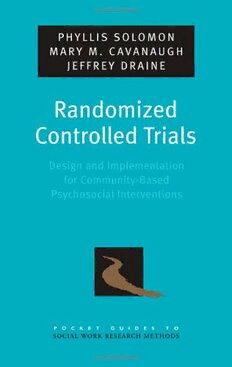
Randomized Controlled Trials: Design and Implementation for Community-Based Psychosocial Interventions PDF
Preview Randomized Controlled Trials: Design and Implementation for Community-Based Psychosocial Interventions
Randomized Controlled Trials P O C K E T G U I D E S T O SOCIAL WORK RESEARCH METHODS Series Editor Tony Tripodi, DSW Professor Emeritus, Ohio State University Determining Sample Size Balancing Power, Precision, and Practicality Patrick Dattalo Preparing Research Articles Bruce A. Thyer Systematic Reviews and Meta-Analysis Julia H. Littell, Jacqueline Corcoran, and Vijayan Pillai Historical Research Elizabeth Ann Danto Confi rmatory Factor Analysis Donna Harrington Randomized Controlled Trials Design and Implementation for Community-Based Psychosocial Interventions Phyllis Solomon, Mary M. Cavanaugh, and Jeffrey Draine Needs Assessment David Royse, Michele Staton-Tindall, Karen Badger, and J. Matthew Webster PHYLLIS SOLOMON MARY M. CAVANAUGH JEFFREY DRAINE Randomized Controlled Trials Design and Implementation for Community-Based Psychosocial Interventions 1 2009 1 Oxford University Press, Inc., publishes works that further Oxford University’s objective of excellence in research, scholarship, and education. Oxford New York Auckland Cape Town Dar es Salaam Hong Kong Karachi Kuala Lumpur Madrid Melbourne Mexico City Nairobi New Delhi Shanghai Taipei Toronto With offi ces in Argentina Austria Brazil Chile Czech Republic France Greece Guatemala Hungary Italy Japan Poland Portugal Singapore South Korea Switzerland Thailand Turkey Ukraine Vietnam Copyright © 2009 by Oxford University Press, Inc. Published by Oxford University Press, Inc. 198 Madison Avenue, New York, New York 10016 www.oup.com Oxford is a registered trademark of Oxford University Press All rights reserved. No part of this publication may be reproduced, stored in a retrieval system, or transmitted, in any form or by any means, electronic, mechanical, photocopying, recording, or otherwise, without the prior permission of Oxford University Press. Library of Congress Cataloging-in-Publication Data Solomon, Phyllis L. Randomized controlled trials : design and implementation for community-based psychosocial interventions / Phyllis Solomon, Mary M. Cavanaugh, and Jeffrey Draine. p. cm. Includes bibliographical references and index. ISBN 978-0-19-533319-0 1.Social service—Research—Methodology. 2. Evidence-based social work. I. Cavanaugh, Mary M. II. Draine, Jeffrey. III. Title. HV11.S5946 2009 361.3'20724—dc22 2008029903 1 3 5 7 9 8 6 4 2 Printed in the United States of America on acid-free paper Acknowledgments W e would like to thank Mallory Jensen for her wonderful competence, responsiveness, and kind understanding. In addition, we want to acknowl- edge Leslie Alexander and Francis Barchi for their helpful comments on previous drafts of the manuscript. We express our gratitude to the review- ers for their thoughtful comments that served to strengthen the fi nal manuscript. We also want to thank the agency administrators and pro- viders who, in their pursuit of more effective interventions for the clients they so selfl essly serve, allowed “outsiders” in to conduct our research. But most importantly, we thank the participants of our research inter- ventions. Without these partners and collaborators sharing our belief in the value of sound research and its connection to more effective services, the many RCTs in which we have been involved would not have been a reality. We are forever indebted to far too many to name each indi- vidually, but without their support and participation we would not have learned the challenges and pitfalls of these deceptively simple designs and therefore, this book would not have been possible. This page intentionally left blank Contents Acknowledgments v 1 Introduction 3 2 Ethical Considerations of Randomized Controlled Trials 19 3 Planning the Randomized Controlled Trial 45 4 Developing Conceptual Foundations for Randomized Controlled Trials 80 5 Designing the Randomized Controlled Trial 96 6 Implementing the Randomized Controlled Trial 138 7 Generalizing Randomized Controlled Trial Outcomes to Community Practice Settings 170 Glossary 187 References 195 Index 209 This page intentionally left blank 1 Introduction The primary objection raised about a randomized controlled trial (RCT) is related to its central feature: the randomness of the decision regarding an individual’s treatment regimen. To some, it seems unethical to base such an important decision on mere chance. In order to examine this objection, it may prove useful to begin with a careful examination into the randomness and rationality in our health and social service sys- tems as they typically operate. Adults and children experiencing acute challenges such as abuse, health crises, mental illness, substance abuse, and incarceration, to name a few, are sorted into varying categories, case- loads, service systems, and need levels, and placed onto wait lists every day throughout a wide variety of settings. How rational are these sorting mechanisms? How often is this sorting accomplished using validated pro- cedures or reliable assessments? How often is this sorting driven by the relatively random availability of an open placement or funding streams? Quite often, the services individuals receive and/or are eligible for are dependent on layers of random decisions far beyond the control of indi- vidual practitioners, case managers, or program directors. Moving the above discussion a step further, it would be useful to inquire to what extent these sorting mechanisms are n ot random, and rather are based on biases and choices that are more unfair than chance? 3
